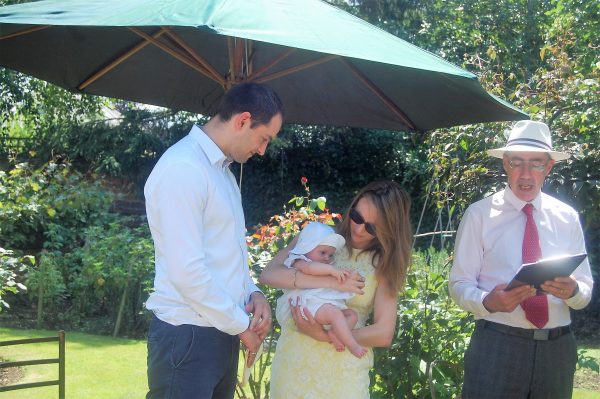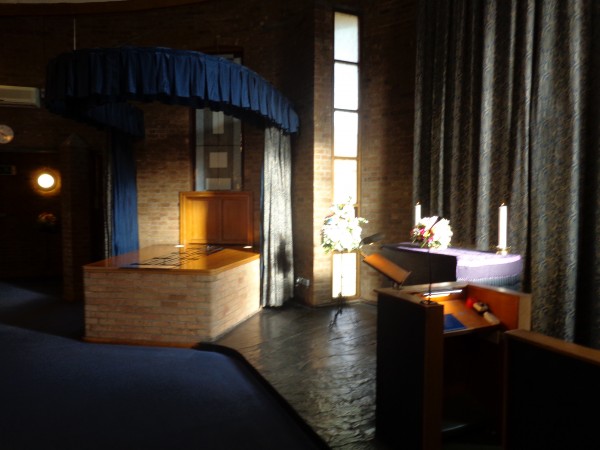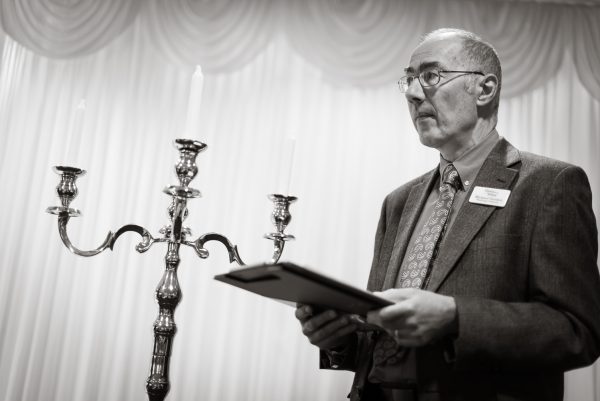
by Michael | Jun 23, 2020 | Blog
Things can move very quickly – it is fair to say that this has so far been an unprecedented year globally. However, since lockdown, speed of change seems to have slowed considerably. Some business owners – notably, in the food and drink and the leisure industries – must feel that change can’t come soon enough.
My own field – life-cycle ceremonies, especially weddings and funerals – is still surrounded by uncertainty.
Funerals
There is no longer any obligation to have direct cremation, although the option remains. So there is at least the opportunity for a ceremony and a degree of closure for families. However, social distancing restrictions mean families cannot attend, if they number more than 30. Those that do often can’t sit together or share a hug for consolation.
There is still the option, of course, for memorial services, scattering of ashes ceremonies, or celebration of life events later – but who knows when these will be permissible?!
Weddings
As of 22nd June, in Wales weddings may take place once more. That means that registrars will conduct ceremonies, with two witnesses present. However, no big celebrations will be allowed. So marriages and receptions will presumably be separate as well as small. (At least, there is the possibility of live-streaming to a wider audience.)
Currently, similar developments will be happening in England from 4th July, so there is a little light at the end of the tunnel.
The 30-people (plus social distancing) limit will apply. There will probably be restrictions on locations too.
The same will apply to namings and vow renewals (which don’t need registrars).
Well, let’s hope things can soon progress and that it will become easier to plan life-cycle events.
I’m happy to chat things over with you, if you are considering such a ceremony.

by Michael | Jun 8, 2020 | Blog
The funeral industry took quite a bashing in Hannah Betts’ recent article in ‘The Telegraph Magazine’ (01.02.20) (with statistics provided by Sunlife).
It wasn’t
all bad news, but much of it was probably quite eye-opening.
In England in the last couple of years pre-COVID, there were over 500,000 deaths/year, and this is expected to increase to 565,000 by 2032. There are increasing space issues regarding burial which need to be met. However, c. 78% of UK funerals are now cremations.
Expenses
The average
cost of a basic UK funeral (not counting flowers and catering) was over £4,000
in 2019. That’s a huge increase since 2004, when it was less than £2,000.
For the
whole works, including professional fees, the average amounted to nearly £9,500.
Apart from burial or cremation fees, there are usually funeral director’s fees
to consider and officiant’s fees. If you’re having a memorial, this can be a
major expense (around £900) and catering costs an average of over £400. There
may also be venue hire. Smaller expenses (but they all add up) are Order of
Service booklets, doctor’s fees, limousine hire, flowers and the death notice.
However,
there’s now a groundswell towards choice. Things don’t have to be done the way
they ‘always’ have been. Whereas some people are fine with the Funeral
Directors in traditional top hat and tails, some people prefer informality.
Indeed, a direct cremation (no ceremony at all) is a cheap option (although not
for everyone).
Green
Ceremonies
Some Funeral
Directors offer budget ceremonies, but, again, it depends on what you want on
the day. There is a lot more awareness of ecology, and you can request green
burials with biodegradable coffins. Crematoria have improved massively and
emissions are cleaner, but carbon is still one of the by-products of the
process. Green or liquid cremations are much less damaging.
Embalming
(to preserve bodies to be viewed by relatives) requires use of formaldehyde for
each body, and this is a carcinogen.
Choice
At a cost,
you can choose unusual venues (such as golf courses) and use special hearses (like
camper vans or fire engines). The service can be personalised, both content,
tone and attire.
Many
funerals these days offer live-streaming facilities.
Add-ons
Basic burial
costs over £1,000 more than cremation on average, but this is region-dependent (it
costs some £4,000 more to be buried in London compared with Northern Ireland).
Summary
As a funeral celebrant, I am one of the “expenses”. Of course. I don’t believe I have to justify my fee, as I normally work with the bereaved to compile, in a short time, a celebration of life that entirely fits the bill. Then I conduct the service – usually, to the family’s (and guests’) complete satisfaction. It takes skill and empathy.
It seems right
that there are fees across the board, although some seem excessive. I suspect
that certain suppliers are taking advantage of clients’ vulnerability and
ignorance. However, I have worked with many who do a fantastic job and deserve
to be rewarded.
The great
thing is that now there is choice out there, and each person has the chance to
get value for their money. Hopefully, the funeral comes down to more than money
finally, but that’s certainly an issue that is rightly being addressed.
Michael can
put together and conduct a personalised ceremony. Feel free to contact him
directly.
by Michael | Jun 1, 2020 | Blog
As an avowed dinosaur, I have greeted the sudden rise of Zoom and live-streaming in 2020 with apprehension. You see, I’m not great with change.
However, I accepted that there’s not much I can do about techy developments, so I decided to make the best of it. Rather to my surprise, I found myself getting used to Zoom. I grudgingly admit that it’s not as bad as all that!
Moreover, I am enabled to pursue my work, even if not quite in the way I would have chosen. That applies both to networking events and marketing. Zoom breakout rooms allow private conversations with other businesses. And it’s always good to be able to see who you are talking to.
Conversations with (potential or actual) clients are better for me face-to-face, but I can still get a feel for their personalities and character online. The experience is probably mutual.
A few of my recent funerals have been live-streamed. As the celebrant, I still address most of my remarks and readings to the (few people) that are with me in the chapel. However, I am careful to glance up at the camera and thereby include onlookers as best I can. I always point out that they are contributing to the event and thank them for their time and trouble.
I’ve also been parked next to a couple in their car, with the windows down, who were watching a funeral through live-streaming. They didn’t appear to feel very involved at first, although they clearly perked up at the eulogy.
My feeling is that it may lack the inclusivity and atmosphere of a regular funeral, but a live-streamed service is a very decent substitute.
A number of weddings are still taking place. Of course, numbers are strictly limited, but Zoom comes into its own here. It also enables people (for example, in far-off countries, or who are unwell) to be part of a celebration they would otherwise have missed. So it can be an absolute bonus.
Well, although I still have a long way to go, I am one dinosaur who has been ever so slightly converted to technology! Where will it end?!

by Michael | May 6, 2020 | Blog
It’s not that easy to come up with a useful or informative blog every week. Even less so under Lockdown. Hardly anything is happening in the world of weddings. Still less in the world of Vow Renewals and Namings. But so much seems to be happening in the world of funerals that it’s impossible to keep up!
So, rather than tell you what you already know or something that is already out of date, here is a bit about me and how I found myself in the world of celebrancy.
Background
I came from a lower middle-class Ealing home, and was pretty conventional till my mid 40s. To summarise incisively, I was a teacher for 25 years, but was to lose my mojo. In fact, I definitely experienced a mid-life crisis, and went through a pretty unpleasant couple of years.
However, unexpectedly, this became a time for personal development. I went into network marketing (health and wellness). I loved the products and that I could help others in quite surprising ways, but the money wasn’t to be earned there (to prosper you need to build teams, and I wasn’t great at that). So I lost a lot of money – yet I have never completely stopped this work.
On the other hand, network marketing demands personal study and growth. I read self-help books, attended workshops and even took on a coach. I began to change, quite without realising it.
When the opportunity for something quite different arose three or so years later, I was ready for it (at least, subconsciously).
The Damascene moment
I met a civil celebrant at a business networking meeting. Having never heard of such a job, I asked him what it entailed. His enthusiasm was infectious, and I was almost hooked. I rang him soon afterwards with a few questions – one of which was “how do I train?” Decision made.
So I trained. I plunged into a profession that I might have dismissed earlier. After all, as far as I had been concerned, a wedding was either a full religious or a secular Register Office ceremony. Surely people shouldn’t be encouraged to choose how their big day should be marked?!
I had been used (by and large) to teaching and presenting. That was largely a one-way process (the way I did it!). My new profession would encourage me to go beneath the surface. I had to help people make their own (informed) choices. It would involve listening to people and understanding their vision by asking the right questions. I would have to guide and advise them, working together with them to achieve their dream. The icing on the cake would be attending beautiful venues to conduct a wonderful ceremony and sharing in their delight.
Seven years down the line, I am still in love with my profession. As I have worked at my delivery, business results have become better – but that was until Coronavirus. Now crystal-ball-gazing is impossible and I may have to rebuild my business from the bottom up.
However, I am optimistic. The work will be out there – after all, why shouldn’t people mark their big day as they would wish? I intend to continue to be available and to deliver an excellent service.
I shall be delighted to deliver dreams as before.
by Michael | Apr 27, 2020 | Blog
More of a newsletter than a blog this week, but I thought I’d update you with what’s happening in the world of life-cycle ceremonies under Coronavirus. It’ll probably all be out of date by next week!
Celebratory
Very little to report here, I’m afraid. Some people are going for Zoom weddings, or the like. That way, depending on the package you have, you can include up to 100 “guests”, so it’s a viable alternative.
Most of my couples have deferred their booking till the autumn (although who knows if that is far enough on?!).
I am still receiving enquiries, but far fewer than I’d normally expect at this time.
Funerals
There is still inconsistency all over the sector. Some cemeteries are re-opening for visits. My local crematorium is talking about re-opening for ceremonies, but has offered no date. Another crematorium I work with (which continues to offer ceremonies) has just announced that the maximum number of mourners allowed is increasing from 10 to 15. Some crematoria offer web-cam or streamed services, so at least other mourners have a chance to be included somehow.
The bottom line is that nobody really seems to know what is happening!
Alternatives
Many people are not satisfied with direct cremation or services with limited attendees. They are planning for the end of lock-down (whenever that may be) and considering any of Celebration of Life ceremonies, Memorial Services or Scattering of Ashes.
On the whole, you can hold these wherever you choose, and, if you’re organising a spread, you can probably have that in the same place as the ceremony.
I would be happy to discuss these possibilities, if I can be of help.



